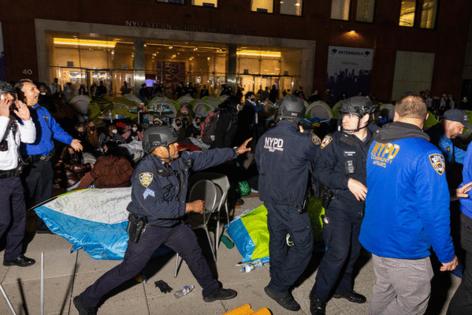Columbia University expels, suspends dozens of students in pro-Palestine Butler Library occupation
Published in News & Features
NEW YORK — Columbia University has expelled and issued lengthy suspensions to dozens of students for participating in the pro-Palestinian occupation of Butler Library just days before final exams in May.
The students who were suspended will be barred from campus for one to three years and have to submit a formal apology, according to protest group Columbia University Apartheid Divest. The sanctions were confirmed by the school, which added that some students were put on probation, while others had their degrees revoked.
“To create a thriving academic community, there must be respect for each other and the institution’s fundamental work, policies, and rules,” said Columbia spokeswoman Millie Wert. “Disruptions to academic activities are in violation of University policies and Rules, and such violations will necessarily generate consequences.”
About two-thirds of the more than 70 disciplinary actions taken on Monday afternoon involved either suspensions or expulsions, a source familiar with the process told the Daily News. The majority of those suspensions will last two years.
During the demonstration, protesters demanding Columbia divest from Israel and angry over the federal immigration detention of graduate student Mahmoud Khalil, pushed through security to occupy the main campus library — forcing the evacuation of nearly 1,000 students studying as they worked to finish the semester.
Activists who refused to identify themselves as a condition for exiting the library clashed with public safety personnel, including two officers who were injured.
The takeover was ultimately short-lived, with the NYPD moving in quickly and making dozens of arrests. Students had been on interim suspensions pending further investigations and barred from campus for the last few months. A majority of protesters apprehended by police were arraigned on desk appearance tickets in late May and their cases adjourned until next month; about 20 others are scheduled for arraignment soon.
Columbia University Apartheid Divest theorized that Columbia’s sanctions were related to negotiations over a potential deal between Columbia and the Trump administration to restore hundreds of millions of dollars, mainly in federal research funding. The public funds were revoked in March as part of the president’s crackdown on higher education and chalked up to concerns that Columbia had not done enough to combat antisemitism.
“While Columbia likes to position itself as opposed to government overreach, the record demonstrates active collusion, not reluctant concessions,” the protest group wrote in a statement.
Last week, Columbia adopted a definition of antisemitism that recognizes some criticism of Israel as antisemitic. Columbia’s acting president, Claire Shipman, insisted such action was necessary regardless of government pressure. But the move — coupled with the latest sanctions — sparked concern among free speech groups.
“We must wonder whether the severity of the punishment was influenced by Columbia’s recent capitulation to the Trump administration to clamp down on student advocacy,” said Veronica Salama, a staff attorney at the New York Civil Liberties Union, which Tuesday released an open letter to Columbia.
It was not immediately clear how many of the students were expelled or what factors led to some protesters facing harsher discipline than others. The Columbia source with knowledge of the disciplinary processes said at what time students left the library played a partial role; protesters were only permitted to exit before police came if they identified themselves.
A college official known as the “rules administrator” — a position as of this spring held by Gregory Wawro — confirmed in a statement that a panel of faculty and administrators “issued findings and sanctions related to the disruption of Butler Library during (the) reading period in May 2025,” but did not offer specifics. Students have five days to appeal the decisions.
“The sanctions take effect after the conclusion of the appeal period and subject to such decisions from any such appeals,” read the memo.
A copy of the suspension notice, shared by student protesters with The News, spelled out two essays students would have to write before being eligible to return to campus.
The first requires that students submit a “statement of reflection” on the disruption takeover, including “the impact on students trying to study.” The other directs them to write letters to Butler staff and janitors who were tasked with cleaning the library afterward.
Columbia University Apartheid Divest said in a press release that some students have stated they will refuse to apologize.
_____
©2025 New York Daily News. Visit at nydailynews.com. Distributed by Tribune Content Agency, LLC.







Comments